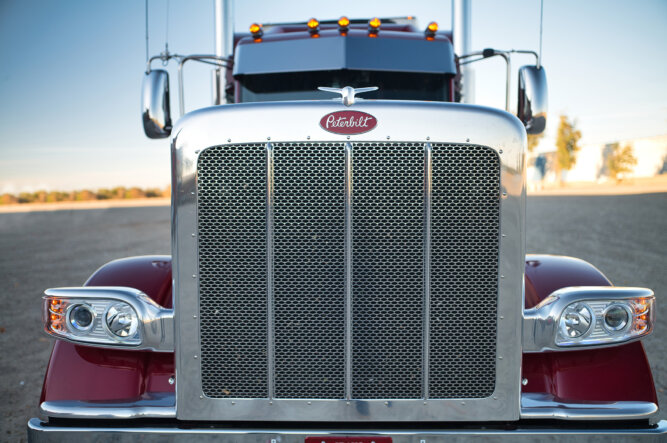Buying a Semi Truck: Guide for First-Time Buyers

What are you waiting for?
Make more money starting now.
Buying a semi-truck for the first time can be both exciting and endlessly complicated. Understanding all of the requirements, market options, warranties, and other details is essential before signing on the dotted line.
We break down everything you need to know about buying a semi-truck and provide guidance when considering new vs. used semi trucks, truck specifications, and after-purchase support.
New vs. Used: Making an Informed Decision
First, you need to decide between buying a new semi truck or a used semi truck. Both options come with advantages and disadvantages, so it’s wise to weigh options carefully before narrowing down your decision.
Buying a new semi-truck
Because these vehicles cost more than buying used models, you’ll take on considerable value depreciation during the first few years. But new vehicles come equipped with updated options and specs, longer warranties, and hopefully, lower maintenance costs.
Pros:
- Access to the latest technology and features
- Full warranty coverage
- No wear-and-tear from a previous owner
- A clean slate for maintenance history
- Higher fuel efficiency (in newer models)
- Potential tax incentives or rebates
- Increased safety features
- Predictable performance
Cons:
- Higher upfront cost
- Value depreciation is significant in the first few years
- May require financing or a larger capital outlay
- No knowledge of actual performance history, and the potential for unforeseen factory defects
- New technology might have a learning curve
Buying a used semi-truck
First-time buyers are often attracted to the more economical option of buying a used semi truck. While costs are significantly lower, buying a used semi truck comes with its own set of considerations.
Pros:
- Lower upfront cost
- Lower monthly payments if leasing
- Less value depreciation
- Potential for lower insurance payments
- More information available (safety, performance) on older models
- More inventory options
Cons:
- Higher mileage
- Potential for both interior and exterior wear and tear: seat rips, body dents, etc.
- Older trucks may have higher-polluting diesel engines
- Risk of a previous owner with bad habits that cause mechanical strain
- Potential unknown history of the vehicle
How to Determine Your Trucking Needs
Once you’ve decided whether to buy a new or used semi-truck, it’s time to consider specifications and what exactly you need from your vehicle.
Start by determining what type of trucking you’ll be doing. Will it be cross-country routes, local hauling, or hot shot trucking? Do you need a day cab? A truck with a sleeper? What about manual vs. automated manual transmission?
Here are some other specifications to familiarize yourself with so that you know what to look for when buying a semi-truck:
- Gross vehicle weight rating (GVWR): The maximum weight a truck is capable of carrying, including cargo, passengers, and fuel.
- Gross combined weight rating (GCWR): The maximum weight allowed when a trailer is attached to the vehicle.
- Tare weight (unladen weight): The weight of your vehicle when empty.
- Engine horsepower and torque: Your vehicle’s capacity for speed, and the engine’s ability to accelerate from a stopped position.
- Transmission type (manual, automatic, automated manual): Fully manual semi trucks are typically less expensive, and are either arranged in a range, splitter, or combination gear box. Automatic transmissions are newer and less common. Automated manual transmissions use hydraulics to make gear shifting smoother and easier.
- Rear axle ratio: The differential of your truck’s gears. A higher axle ratio means more power.
- Wheelbase length: The space between front and rear wheels. Longer wheelbases make for more comfortable driving over various terrains, but shorter wheelbases can save gas mileage and manipulate turns better.
- Cab type (day cab, sleeper cab, extended cab): The space designated for the driver. Day cabs are short with only seats up front. Sleeper cabs include a bed and space for a few items; extended sleeper cabs are longer and sometimes include a kitchenette and shower.
- Fuel tank capacity and type: Traditional diesel (with either one or two fuel tanks), CNG (compressed natural gas) and electric power.
- Emissions compliance (Euro 6, EPA standards): Depending on the country you live in, semi trucks will have different emissions standards. Make sure the truck you buy complies with current requirements.
You will also need to be aware of the suspension type (air, leaf spring), brake system (e.g., air brakes, disc brakes), tire size and type, frame strength (single rail, double rail), and turning radius of your semi-truck. Also consider the intended freight type (e.g., refrigerated, flatbed, tanker), distance of hauls, route terrain, desired lifespan and durability, driver comfort, telematics, and towing and hauling requirements.
Importance of Warranty and After-Sales Support
A warranty can serve as an extra layer of assurance you won’t be required to pay thousands out of pocket for unexpected mechanical issues as your truck ages. This helps you keep your truck in prime working condition, protecting your investment.
For new semi trucks, the manufacturer will include a warranty that lasts anywhere from 12 months to 5 years, or up to a certain number of miles. There is also the option for longer-term warranties. These may add more to your total cost but can save you thousands in the long run.
Used semi trucks may not include a warranty, but you can purchase a warranty from a third-party provider. SelecTruck’s Select Limited Warranty offers an industry-leading warranty for used semi trucks, with a $0 deductible.
Buying From the Right Source
Working equipment is primary to be able to do your job. So when buying a semi-truck, be sure to purchase from a reputable dealer or reliable seller. A reputable dealer A trusted partner will include benefits such as careful inspections, financing options, and after-sales support like comprehensive warranties. If you’re buying a pre-owned truck, reliable sellers will be transparent about the vehicle’s history, helping you make a safe and educated purchase decision.
Buying a semi-truck from someone you don’t know isn’t entirely off the table, but it does come with higher risks. Purchasing a truck from someone who doesn’t work with a dealership could result in a truck with a short life span, unexpected repair costs, liability issues, and lower fuel efficiency. Any maintenance issues will keep you off the road, and it can be hard to make up for lost time and get a return on your investment.
Get the Most Out of Your Truck Purchase
Buying a semi-truck is a decision that requires a lot of research, forethought, planning, and budgeting. Once you’ve found a reputable seller, a warranty that works for you, and all the right specifications, let us join you on the road.
Try out the Truckstop Load Board to find more loads, get paid on time, and make the most out of your semi truck investment.
Frequently Asked Questions
Listen up!
Check out our podcast, Freight Nation, where industry experts talk all things trucking.

Find out how our platform gives you the visibility you need to get more done.
Get helpful content delivered to your inbox.
Schedule a demo.
Find out how our platform gives you the visibility you need to get more done.





